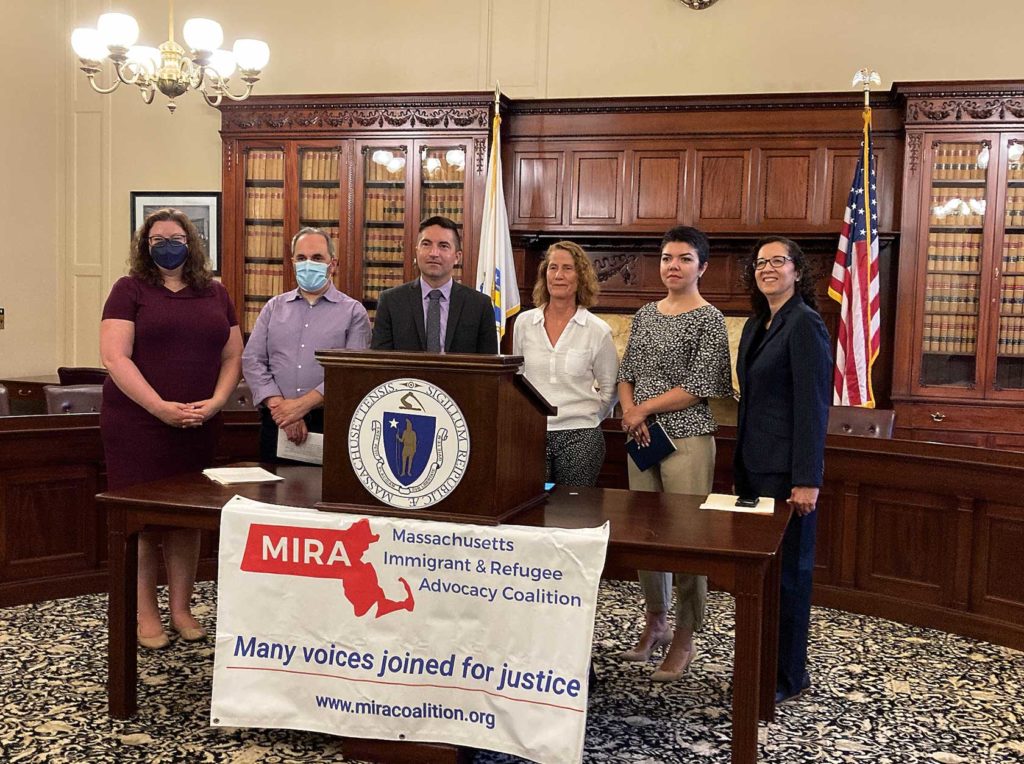Lawmakers seek licensure for immigrants
Few professionals licensed in other countries practice here

State Rep. Jack Lewis of Framingham, a group of board members of the Massachusetts Immigrant and Refugee Coalition (MIRA) and two internationally trained medical professionals gathered July 15 to speak in the State House to address the struggles of internationally trained medical professionals and present a new report by a commission comprising state representatives, members of the state licensing board, hospital associations and medical schools.
The report focuses on the more than 12,000 internationally trained medical professionals living in Massachusetts who have long faced barriers to becoming licensed, including difficulty in getting access to residency programs and limited visa waivers, to the point where, according to MIRA, “more than 1 in 5 foreign trained healthcare professionals in Massachusetts are unemployed or working in a low wage, low-skilled job.”
Some of the barriers the group proposes eliminating are the English proficiency test and the seven-year time limit for completing the United States Medical Licensing Examination. Other recommendations in the report include giving health profession board staff culturally appropriate training, developing easy-to-follow licensing guides, lowering the minimum number of years required for full licensure eligibility, and developing a pathway for internationally trained medical professions that includes limited mentored licensure and two years practicing in a shortage specialty, which would result in eligibility for unrestricted licensure.
“One of the first bills I ever filed, shortly after being sworn in, was with Senator Jason Lewis and MIRA to create this commission,” said Lewis, the sponsor of a bill filed in the state legislature focused on these issues. “Today that commission takes a critical step in supporting our Commonwealth’s thriving and skilled immigrant community and in addressing critical inequities in health care access across our Commonwealth.”
But even after internationally trained healthcare professionals obtain their licenses, their struggles are far from over.
“Due to the barriers that make it difficult for international trained medical professionals to apply their skills here in Massachusetts, I started out as an assistant,” said Venezuela-trained dentist Herlivi Linares. “Eventually, I obtained a license to practice dentistry in community health centers. But to practice, I had to remain under supervision of a fully licensed dentist. But as restricted as I am, I am one of the lucky ones. Because of a stigma … international trained professionals face, few are actually hired by community health centers.”
The July 15 press conference also highlighted how making the path to licensure easier for foreign trained medical professionals can help address Massachusetts’ health inequalities and shortage of professionals in rural and underserved areas of the commonwealth. According to data presented in the report, in Bristol, Plymouth, Hampden and Franklin counties, there are more than 1,400 patients for every physician. Additionally, in Bristol, Plymouth, Franklin, Hampshire and Worcester counties, there are 1,290 patients for every dentist.
The report recommends that Massachusetts put internationally trained medical professionals to good use by creating a pathway to licensure that includes a minimum two years practicing in an underserved area of the state, including the counties mentioned above.
“These immigrants and refugees often bring extensive education and experience with them to America, which they deserve to put to use,” the report reads. “In doing so, they may serve Massachusetts patients that are unfortunately … underserved now.”
Robert Marlin, a member of the commission and chief of the Metta Health Care Center, said, “The Commission’s proposed pathway to licensure for internationally trained physicians would be the first of its kind in the country, establishing Massachusetts as a leader in this area, as it is in so many other areas of healthcare.”






